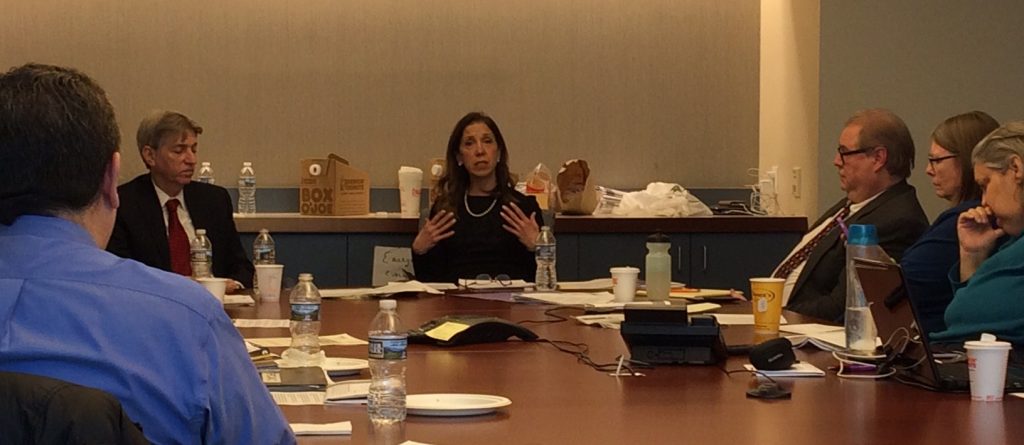The MTA is the City’s lifeline, the circulatory system of economic activity for the greater New York Area. While the MTA allows for a vibrant flow of people, delays within the system interrupt this flow and has significant effects on the economy. The aging infrastructure, means high state of good repair costs and although billions of dollars have been spent, catching up after decades of neglect is difficult. Understanding the high costs and where inefficiencies lie is of critical importance today. Greater analysis and transparency is required to understand construction costs and their comparisons to other cities such as London and Paris.
Assemblywoman Amy Paulin visits the Permanent Advisory Council Quarterly meeting.
For last month’s PCAC meeting, the guest speaker was Assemblywoman Amy Paulin, Chair of the New York State Assembly Committee on Corporations, Authorities and Commissions. The Committee oversees the MTA’s Capital Program policy, planning, and budget approval. Representing areas of Westchester County, Paulin understands and values the needs of commuters, and also takes into account the challenges the MTA faces. Having only served as the Chair for three months (in the legislator for 17 years), she stated that insuring the MTA is transparent is one of her top priorities.
Like other transit advocates, Paulin called into question the prioritization of projects, specifically for the Enhanced Stations Initiative Program that are concentrated in Manhattan and did not all include ADA treatments, such as elevators and escalators. She believes prioritization of MTA projects should reflect riders’ biggest concerns and how projects are prioritized should be a very transparent process.
Even Paulin agrees the finger pointing between the city and state is frustrating, and in the end, the riders suffer.
Instead of shifting blame, Paulin believes a sustainable and steady funding source is needed to fund transit improvements. Thankfully, there is one in sight; congestion pricing, put forth to the legislature by the FixNYC panel, which should provide a protected revenue stream immune to the political tug-o-war, while relieving traffic in the central business district and increasing bus speeds.
To move it forward, Paulin is dedicated to convincing her colleagues in Albany the importance of getting behind congestion pricing. She noted that most people do not understand the plan fully nor the severity of the MTA crisis. There is currently $7.3 billion of the original $32 billion for the 2015-2019 Capital Program left unfinanced. If passed, congestion pricing could have helped fund the remaining cost. Additionally, Paulin also expressed her interest in value capture, which would be a significant boost as well, but the details have yet to be planned.
The Need for Oversight and Accountability.
As the Committee Chair, Paulin is in charge of oversight and accountability of the MTA. This includes turning around the current narrative, especially with respect to accuracy and data. When the public is given numbers for causes of delays, Paulin stated:
“We need to be able to trust them. If not, we lose confidence in those running the system.”
The absence of apology in light of the Con-Edison scandal was disappointing, and more transparency is needed to establish a sense of integrity and public trust. This starts with clear communication, openness, self-reflection as an authority, and the ability to come forth on issues right away.
An important first step is educating legislators, lawmakers, political decision makers, and the public about the current issues the MTA faces. Teaching transit literacy would contextualize transportation issues for riders and state politicians who are not as close to the conversations.
